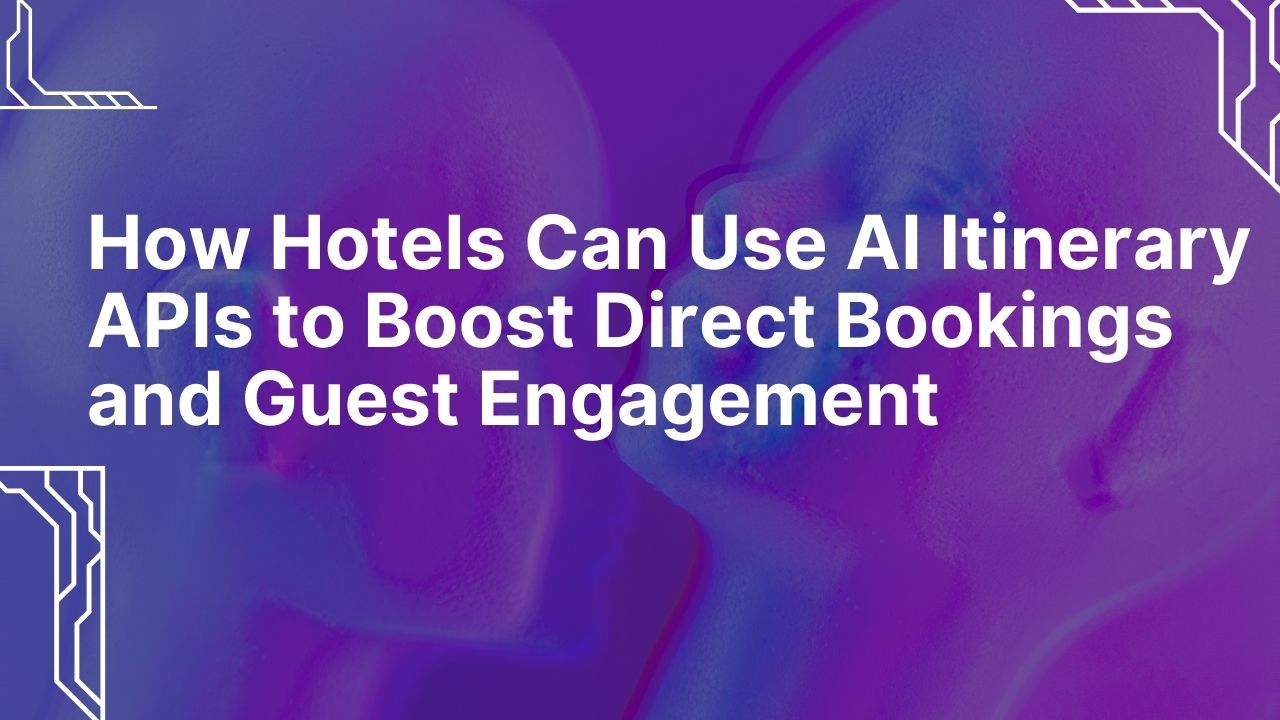The hospitality industry is in the midst of a tech transformation. With guests expecting personalized experiences and seamless digital interactions, hotels are turning to artificial intelligence (AI) not just for chatbots or pricing tools—but for curated itinerary generation.
Integrating AI itinerary APIs can be a powerful strategy for hotels to drive direct bookings, enhance guest satisfaction, and increase loyalty.
Let’s explore how this works, what benefits it brings, and why it’s becoming a must-have for forward-thinking hospitality brands.
The New Guest Expectation: Personalized, Effortless Travel
Today’s traveler doesn’t just want a place to sleep. They want:
- A curated list of nearby activities
- Tailored restaurant suggestions
- Efficient planning for their limited time
- A smooth, mobile-first interface
And they want it before they even check in.
AI-generated travel itineraries allow hotels to go beyond offering “concierge tips” by delivering real-time, customized trip plans that align with a guest’s profile, purpose, and interests.
What is an AI Itinerary API?
An AI itinerary API is a backend service that hotels can plug into their websites, apps, or booking engines. Once integrated, it allows guests to:
- Enter their destination, dates, and preferences
- Receive a full multi-day itinerary within seconds
- Adjust or personalize their plans in real time
- Sync with bookings, transport, and local events
- Access everything from their mobile device or room tablet
This turns a static hotel website into a personalized trip-planning hub—one that adds real value before, during, and even after the stay.
Why Should Hotels Use It?
1. Drive More Direct Bookings
Hotels that offer added-value services like AI itinerary planning stand out in a crowded online booking landscape. When travelers know they’ll get a full travel experience—not just a bed—they’re more likely to book directly instead of through OTAs (Online Travel Agencies).
Example: A guest booking directly on your site is offered a free personalized itinerary tool powered by AI. This increases perceived value and gives your site a competitive edge.
2. Enhance Guest Experience
By offering a ready-to-go travel plan, you help reduce decision fatigue. Guests feel taken care of from the moment they land on your website.
If your itinerary includes nearby hidden gems, dining spots, or partner activities, the experience becomes even more memorable and local—exactly what travelers crave.
3. Upselling and Cross-Selling Opportunities
An itinerary platform can recommend:
- Hotel spa or restaurant bookings
- Room upgrades based on the trip type (romantic, family, business)
- Partnered tours or local transport options
This not only increases revenue but deepens the relationship between guest and brand.
How AI-Powered Platforms Do It
Advanced travel AI systems like Navoy, TripBuilder, and SmartTourist offer B2B solutions that hotels can integrate. These systems:
- Use real-time data (weather, crowd levels, availability)
- Personalize based on user inputs and behavior
- Provide APIs for seamless white-label integration
- Allow co-editing of itineraries between guests and hotel staff
- Include analytics to track what guests engage with the most
With Navoy’s itinerary API, for example, a hotel can offer a branded planning tool on their website that delivers personalized travel plans while collecting valuable user insights.
A Sample Use Case
Imagine this:
A boutique hotel in Lisbon integrates an itinerary API on its booking page. A traveler books a room for five nights and is instantly invited to “Start Planning Your Lisbon Trip Now.” They enter that they love art, food, and scenic walks.
Within seconds, the system proposes:
- A visit to LX Factory on Day 1
- A pastel de nata tasting tour on Day 2
- A curated walking path through Alfama
- Dinner reservations near their hotel
They can modify it, add personal notes, or share it with their travel partner. The hotel gains:
- A more satisfied guest
- Insight into guest preferences
- A higher chance of booking partner experiences
Implementation Doesn’t Have to Be Hard
Modern API providers understand that not every hotel has a tech team. That’s why leading providers offer:
- No-code/low-code integration
- White-labeled interfaces
- Multilingual and multi-currency support
- Options for both web and mobile
In a matter of days, hotels can have an AI itinerary planner live on their site—branded, personalized, and guest-ready.
Conclusion
AI itinerary APIs are redefining the hotel guest experience. They turn hotels into trip companions, not just accommodation providers. By helping guests feel prepared, cared for, and inspired, hotels gain loyalty, increase revenue, and stand out in a digital-first market.
It’s no longer a question of if hotels should use itinerary APIs—it’s a question of when. And the earlier your brand integrates this smart layer of service, the more future-proof your guest experience will be.





